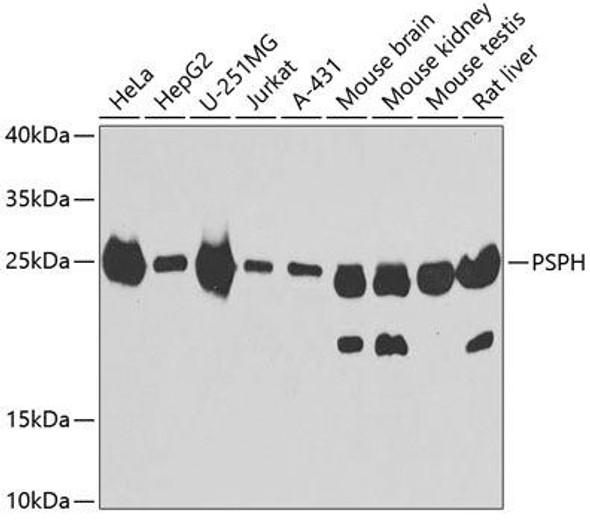PSPH Monoclonal Antibody [P3G12AT] (CPAB0154)
- SKU:
- CPAB0154
- Product Type:
- Antibody
- Antibody Type:
- Monoclonal Antibody
- Reactivity:
- Human
- Host Species:
- Mouse
- Isotype:
- IgG1
- Clone:
- P3G12AT
- Applications:
- WB
- ELISA
Description
PSPH Monoclonal Antibody [P3G12AT] (CPAB0154)
The PSPH Polyclonal Antibody (CPAB0154) is a valuable tool for researchers studying PSPH, a key enzyme involved in serine biosynthesis and lipid metabolism. Raised in rabbits, this antibody is highly specific to human samples and has been validated for use in various applications, including Western blotting.PSPH plays a crucial role in cell proliferation and metabolism, making it an important target for research in cancer and metabolic disorders. By detecting and analyzing PSPH levels in different cell types, researchers can gain insight into its function and potential as a therapeutic target.
This antibody is ideal for studies in biochemistry, molecular biology, and biomedical research, providing valuable information for developing new treatments and interventions for conditions related to PSPH dysregulation. Explore the role of PSPH in cellular processes and disease pathology with the PSPH Polyclonal Antibody.
| Product Name: | PSPH Antibody |
| Product Sku: | CPAB0154 |
| Size: | 5μg |
| Host Species: | Mouse |
| Immunogen: | Anti-human PSPH mAb, is derived from hybridization of mouse SP2/ myeloma cells with spleen cells from BALB/c mice immunized with recombinant human PSPH amino acids 1-225 purified from Ecoli. |
| Clone: | P3G12AT. |
| Reactivity: | Human |
| Applications: | Western Blot, ELISA |
| Purification Method: | PSPH antibody was purified from mouse ascitic fluids by protein-G affinity chromatography. |
| Isotype: | IgG1 |
| Background: | Human Phosphoserine phosphatase (hPSP) is an important enzyme in the phosphorylated pathway of serine biosynthesis, which contributes a major portion of the endogenous L-serine. Similar to known L-3-phosphoserine phosphatases, it catalyzed the Mg2+-dependent hydrolysis of L-phosphoserine and an exchange reaction between L-serine and L-phosphoserine. Recently, its complex structures reveal that the open-closed environmental change of the active site, generated -helical bundle domain, is important to substrate by local rearrangement of the recognition and hydrolysis. |
| Synonyms: | Phosphoserine phosphatase, EC 3.1.3.3, PSP, O-phosphoserine phosphohydrolase, PSPase, L-3-phosphoserine phosphatase, PSPH. |
| Storage Buffer: | For periods up to 1 month store at 4°C, for longer periods of time, store at -20°C. Prevent freeze thaw cycles. |




